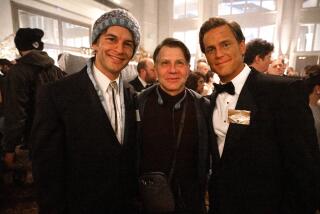TV Reviews : A Lowbrow Look at the ‘Littlest Victims’ of AIDS
- Share via
It’s 1982, and a doctor has diagnosed AIDS in several of his non-gay, non-addict patients, but the public, the medical community and especially the Reagan Administration are all seen as suspicious or nonplussed about what was still widely considered a “gay plague.” It’s “the wrong disease, hitting the wrong people,” says one of the many naysayers who tries to keep this medical maverick in his place.
Does this sound a little like something out of “And the Band Played On,” the landmark investigative book about the neglect of AIDS in the earlier part of this decade? It should, but it’s been watered down for popular consumption. “The Littlest Victims,” a TV movie airing Sunday at 9 p.m. (on Channels 2 and 8), is pretty much the lowbrow companion piece to that tome, assigning plenty of historical blame for the escalating AIDS crisis but in a dramatically simplistic and sentimental manner that Mom, Dad, Grandma and, heck, the whole family can enjoy.
Hypocrisy hunters might be able to find a wee twinge here: The film makers get on the case of the authorities for underplaying the disease’s significance as long as it was mostly limited to homosexuals. Yet the movie’s way of tugging at heartstrings includes neglecting to create a single gay character among the litany of victims.
Instead we get cute kids, all about to be cut down in the prime of their presumably heterosexual childhood, all due to bad blood transfusions or repentant parents who made boo-boos. It’s a sympathetic way into the tragedy for a TV audience, certainly, but can the film makers really be critical of those who leave homosexuals out of the equation when they do the same thing with their plot?
That debatable quibble aside, the movie has its politically correct heart in the right place. It’s only dramatically that it is really prone to attack. The hero is Dr. James Oleske (Tim Matheson), a New Jersey pediatrician who butts heads with his superiors when he concludes that several children suffer a condition previously assumed to be exclusively sexually transmittable.
Generally unconvincing as it is, “The Littlest Victims” is not without moments of clarity, as when a distraught mother asks, “I messed up my own baby--is that what you’re saying to me?” Even that scene doesn’t play as an epiphany should, but set apart from its soft dramatic bed to loll around in the consciousness of the viewer, it’s a horrifying thought--which, when all is said and done, may be enough for one show to induce.
More to Read
The complete guide to home viewing
Get Screen Gab for everything about the TV shows and streaming movies everyone’s talking about.
You may occasionally receive promotional content from the Los Angeles Times.






